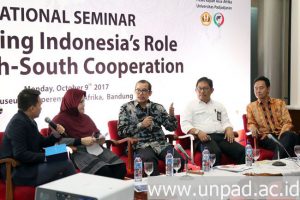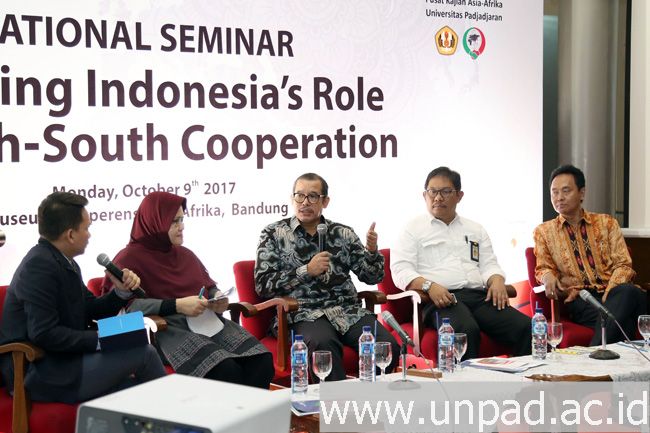Indonesia with other developing countries agreed to declare South-south and Triangular Cooperation or Kerja Sama Selatan-selatan dan Triangular (KSST). This cooperation is considered importantly as Indonesia contributory effort for jointly improving the developing countries capacity.

The Head of Multilateral Policy Analysis and Development Center at the Ministry of Foreign Affairs of Republic of Indonesia, Fikry Cassidy said that Indonesia is trusted to help improving developing countries capacity. This cooperation is based on solidarity, equality, and win-win situation between Indonesia and developing countries.
As the speaker of National Seminar “Exploring Indonesia’s Role in South-south Cooperation” at the Asian-African Conference Museum, Bandung, Monday (9/10), Fikry explained that this cooperation philosophy is taken from the values which were born after the Asian-African Conference had been held.
Therefore, the support given by Indonesia is not similar to other supports given by developed countries. The support forms given by Indonesia are training, human resources development, science and technology transfer, workshop, and internship program.
As the follow-up, Indonesia routinely donates various facilities and technologies.
Fikry explained, by reflecting on the Asian-African Conference or Konferensi Asia-Afrika (KAA) that could encourage the third countries independence, Indonesia’s contribution for South-South and Triangular Cooperation or Kerja sama Selatan-selatan dan Triangular (KSST) is no longer in doubt.
On the other side, the economic condition of Indonesia is increasing at the global level. Indonesia’s admission as a member country of G20 encouraged the activeness of contribution improvement for developing countries.
“The budget of Indonesia’s support in KSST has been increasing tenfold since 2016 according to estimation data,” said Fikry.
KSST manifestation has been actively driven by Ministry and State-owned Enterprises. However, Fikry also encouraged this cooperation to involve all aspects, including academics and college students.
Meanwhile, the Lecturer of International Relationship of FSIP Unpad, Viani Puspita Sari, S. IP., MM, said that, despite becoming the contributor, Indonesia is still in the lower middle class. Therefore, this position makes Indonesia not want to become the ruler of economy performer.
“KSST has been done merely as an implementation of Indonesia’s responsibility as the G20 country member,” said Viani.
The support programs such as training and science transfer are expected to continue. Viani encouraged this cooperation to continue up to technical matters. “If we indeed focus on this goal, even if the level is lower middle class, we have to handle it seriously,” said Viani.
The seminar held for the cooperation of Unpad’s Asian-African Study Center and RI’s South-south National Coordination team was also attended by other speakers, the Head of Education and Water Resources and Construction of Kemepurp, Ir. K. M. Arsyad, and the lecturer of Universitas Parahyangan, Yulius Purwadi.*

